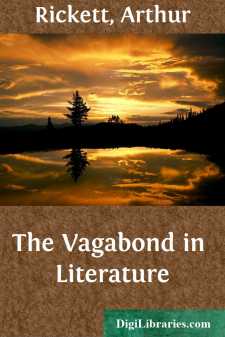Categories
- Antiques & Collectibles 13
- Architecture 36
- Art 48
- Bibles 22
- Biography & Autobiography 813
- Body, Mind & Spirit 142
- Business & Economics 28
- Children's Books 15
- Children's Fiction 12
- Computers 4
- Cooking 94
- Crafts & Hobbies 4
- Drama 346
- Education 46
- Family & Relationships 57
- Fiction 11828
- Games 19
- Gardening 17
- Health & Fitness 34
- History 1377
- House & Home 1
- Humor 147
- Juvenile Fiction 1873
- Juvenile Nonfiction 202
- Language Arts & Disciplines 88
- Law 16
- Literary Collections 686
- Literary Criticism 179
- Mathematics 13
- Medical 41
- Music 40
- Nature 179
- Non-Classifiable 1768
- Performing Arts 7
- Periodicals 1453
- Philosophy 64
- Photography 2
- Poetry 896
- Political Science 203
- Psychology 42
- Reference 154
- Religion 513
- Science 126
- Self-Help 84
- Social Science 81
- Sports & Recreation 34
- Study Aids 3
- Technology & Engineering 59
- Transportation 23
- Travel 463
- True Crime 29
The Vagabond in Literature
by: Arthur Rickett
Description:
Excerpt
There are some men born with a vagrant strain in the blood, an unsatiable inquisitiveness about the world beyond their doors. Natural revolutionaries they, with an ingrained distaste for the routine of ordinary life and the conventions of civilization. The average common-sense Englishman distrusts the Vagabond for his want of sympathy with established law and order. Eccentricity and unconventionality smack to him always of moral obliquity. And thus it is that the literary Vagabond is looked at askance. One is reminded of Mr. Pecksniff: “Pagan, I regret to state,” observed that gentleman of the Sirens on one occasion. Unhappily no one pointed out to this apostle of purity that the naughtiness of the Sirens was not necessarily connected with paganism, and that the siren disposition has been found even “in choirs and places where they sing.”
Restlessness, then, is one of the notes of the Vagabond temperament.
Sometimes the Vagabond is a physical, sometimes only an intellectual wanderer; but in any case there is about him something of the primal wildness of the woods and hills.
Thus it is we find in the same spiritual brotherhood men so different in genius and character as Hazlitt, De Quincey, Thoreau, Whitman, Borrow, Jefferies, Stevenson.
Thoreau turned his back on civilization, and found a new joy of living in the woods at Maine. ’Tis the Open Road that inspired Whitman with his rude, melodic chants. Not the ways of men and women, but the flaunting “pageant of summer” unlocked the floodgates of Jefferies’ heart. Hazlitt was never so gay, never wrote of books with such relish, as when he was recounting a country walk. There are few more beautiful passages than those where he describes the time when he walked between Wrexham and Llangollen, his imagination aglow with some lines of Coleridge. De Quincey loved the shiftless, nomadic life, and gloried in uncertainties and peradventures. A wandering, open-air life was absolutely indispensable to Borrow’s happiness; and Stevenson had a schoolboy’s delight in the make-believe of Romance.
II
Another note now discovers itself—a passion for the Earth. All these men had a passion for the Earth, an intense joy in the open air. This feeling differs from the Nature-worship of poets like Wordsworth and Shelly. It is less romantic, more realistic. The attitude is not so much that of the devotee as that of the lover. There is nothing mystical or abstract about it. It is direct, personal, intimate. I call it purposely a passion for the Earth rather than a passion for Nature, in order to distinguish it from the pronounced transcendentalism of the romantic poets.
The poet who has expressed most nearly the attitude of these Vagabonds towards Nature—more particularly that of Thoreau, Whitman, Borrow, and Jefferies—is Mr. George Meredith.
Traces of it may be found in Browning with reference to the “old brown earth,” and in William Morris, who exclaimed—
“My love of the earth and the worship of it!”
but Mr. Meredith has given the completest expression to this Earth-worship.
One thinks of Thoreau and Jefferies when reading Melampus—
“With love exceeding a simple love of the things
That glide in grasses and rubble of woody wreck;
Or change their perch on a beat of quivering wings
From branch to branch, only restful to pipe and peck;
Or, bristled, curl at a touch their snouts in a ball;
Or, cast their web between bramble and thorny hook;
The good physician Melampus, loving them all,
Among them walked, as a scholar who reads a book.”
While that ripe oddity, “Juggling Jerry,” would have delighted the “Romany”-loving Borrow.
Indeed the Nature philosophy of Mr. Meredith, with its virile joy in the rich plenitude of Nature and its touch of wildness has more in common with Thoreau, with Jefferies, with Borrow, and with Whitman than with Wordsworth, Coleridge, Shelley, or even with Tennyson—the first of our poets to look upon the Earth with the eyes of the scientist....


